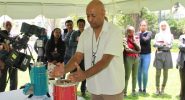The United Sates Embassy in Addis Ababa is to host a demonstration event to showcase efficient cook stoves that can eliminate more than 95% of indoor air pollution and reduce fuel requirements by 90%. The Embassy has partnered with U.S. Fulbright Scholar, Professor Tsegaye Nega.
In addition to cooking, the stoves can also be used to light a room or charge a cell phone.Every year over 60,000 people, mostly women and children die in Ethiopia because of indoor air pollution arising from the use of solid fuels (i.e., wood, cow dung, crop residue, and charcoal) for cooking and heating using open fires or traditional stoves.
Another 5 million suffer respiratory diseases. The environmental impact of these activities is equally serious: to supply charcoal to urban areas of Ethiopia alone, the equivalent of approximately 29,000 hectares of forest is cleared every year.
This is the same as the combined areas of Bole, Akaki, Addis Ketema, Arada, and Gulele sub cities of Addis Ababa. On August 1st, 2018, Professor Nega and his colleagues launched a field test of what they call the “stove + pellets + charcoal buyback” business model in Addis Ababa. This three-prong approach seeks to demonstrate that more efficient cookstoves make economic sense as well as being good for the environment and human health.
- First, the stoves eliminate over 95% of the indoor air pollution, reduce fuel use by 90%, saving money and stopping an estimated 4 tons of carbon dioxide from being released into the atmosphere from traditional fuel production methods.
- Second, the fuel pellets are made entirely from waste biomass, including sawdust, wood chips, coffee husks, spent coffee grounds, and other waste products that are cheap to obtain and would otherwise be discarded. Finally, the team is working to develop a buyback program for the charcoal that is produced by the stoves for use as fertilizer that can benefit crop production while sequestering the carbon in the soil.
Over the last several years, Professor Tsegaye Nega, who is currently serving as a Fulbright Scholar at Addis Ababa University from 2017-2019, has been working with his colleagues at Carleton College, Minnesota, to develop and test the performance of improved biomass gasifier stoves and the fuel pellets that power them.
Signed into law in 1946, The Fulbright U.S. Student Program is the flagship educational exchange program sponsored by the U.S. government. It is largest U.S. exchange program offering opportunities for students and young professionals to undertake international graduate study, advanced research, university teaching, and primary and secondary school teaching worldwide.

